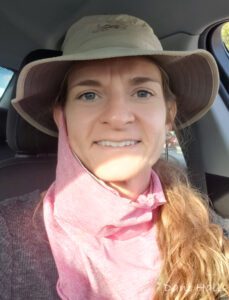I have read articles about Black skimmers that describe them as funny or curious-looking birds, but if you get the chance to experience one up close, you discover that they are a beautiful and fascinating species. We are lucky that in our area, if you know where and when to look you can get some wonderful glimpses of them gliding across the water at dusk or huddled together along the shoreline.

Black skimmers are related to terns and use their uneven bill to skim the water for fish. Their lower mandible acts like a plow through the water so the skimmer can capture the small fish that school near the surface. We believe they sense the fish with their bill and not their eyes as people often observe them foraging in the evening hours after sunset.
In my experience monitoring skimmer nests, they have around three eggs (they can have more), but rarely do all three fledge successfully. The eggs are a lovely white with speckles of black, brown, gray, and sometimes green.
To say that skimmers have a nest is misleading because what they actually have is just a slight depression in the sand that they dig out with their feet. If you ever get to witness this, it is ADORABLE! Skimmers are excellent and dedicated parents with both mom and dad sharing the load of provisioning food for their chicks.
Skimmer chicks are just the most adorable little fluff balls you have ever laid eyes on! Spotting them within a colony is the tricky part because of their very light coloration that helps them to blend in and avoid predators. Well…mostly. Unfortunately, eggs and chicks are susceptible to predation from crows, hawks, and gulls.
Here in Florida, skimmers are found along coastal areas, estuaries, lakes, and large rivers. They have also been known to nest on rooftops in our area. In the heat of the summer. In Tampa Bay! Mad respect.


Oh, and they bark… well at least that is what their call sounds like to me. Like everything else skimmer related, it’s adorable.
This lovely little bird is in great risk of becoming endangered and sadly they are being hit from all sides. Not only are they losing valuable nesting space to increased coastal development, but their food supply is also of concern because of pollution, climate change, and overfishing.
I list many of the threats at the end of this post, but I wanted to take a moment and touch on some of the major issues in more detail.
Fireworks
For a number of people fireworks represent celebration and fun, but for children and adults living with sensory issues, PTSD, or generalized anxiety disorder, fireworks can represent a night of incredible discomfort and trauma.
This also affects other mammals and wildlife as well. Imagine you are a little bird with your nest and suddenly bombs are going off nearby. When there is an intense perceived threat, like fireworks, the adult birds will flush and abandon the colony. If there is enough time left in the season they may try again, but the damage has been done and there will be less chicks fledging as a result. Don’t even get me started on the environmental impact…


Feeding The Gulls
This is never a good idea anyway. We feed them our junk food which we shouldn’t even be eating. Can you tell this one makes me a little testy! Seriously, when we feed the gulls on the beach, we are altering their natural behavior and training them in a negative way. We feed them and when they become a nuisance due to our training, we punish them for our actions. Not cool.
A flock of mobbing gulls trying to get at your Cheetos is also a bad situation for the nesting skimmers. Gulls will prey on skimmer eggs and chicks, so a mob of gulls near a nesting site can pose a significant threat. The adults may also flush and leave the colony exposed to other predators.
So please, be mindful when you are on the beach or in a parking lot, and understand that gulls are very good at finding their own way and really should be getting their own lunch.
Dogs On The Beach
Who doesn’t love a good romp on the beach with their fur baby on a beautiful day? Unfortunately, during nesting season dogs on the beach can be quite destructive to a colony of shorebirds. I have witnessed dogs running through colonies and the loss that comes with such a scenario.
We simply need to be respectful of their space during that time. There are many beaches and parks in our area where shorebirds are not nesting so taking our furry friends there to play would be a wonderful opportunity to explore a new area.


Get Involved
Audubon Florida has a shorebird nest monitoring program where volunteer stewards educate the beachgoers and tourists about the nesting skimmers and protect the colony from disturbance. Nesting season typically begins in March and goes through the summer and into September depending on the season.
I have witnessed some of the trials that they face during my time as a volunteer, and it seems terribly unfortunate that we as humans take so much, and they really need so little. Here is the link to Audubon’s volunteer page if you are interested in becoming a bird steward. It is a wonderful opportunity to witness this special time for these beautiful birds as well as to educate the public about why they are so worth protecting.
Threats To Skimmer Nesting Colonies:
- Balls, frisbees, toys, etc
- Bicyclists
- Dogs (even on a leash)
- Motor vehicles, golf carts
- Holes in the sand (chicks can fall in and die)
- Trash
- Fireworks
- Feeding the gulls
- Kites
- Unskillful boaters
- People trespassing into a colony (children running through the flock)
- Storms
- Coastal flooding
- Predation


